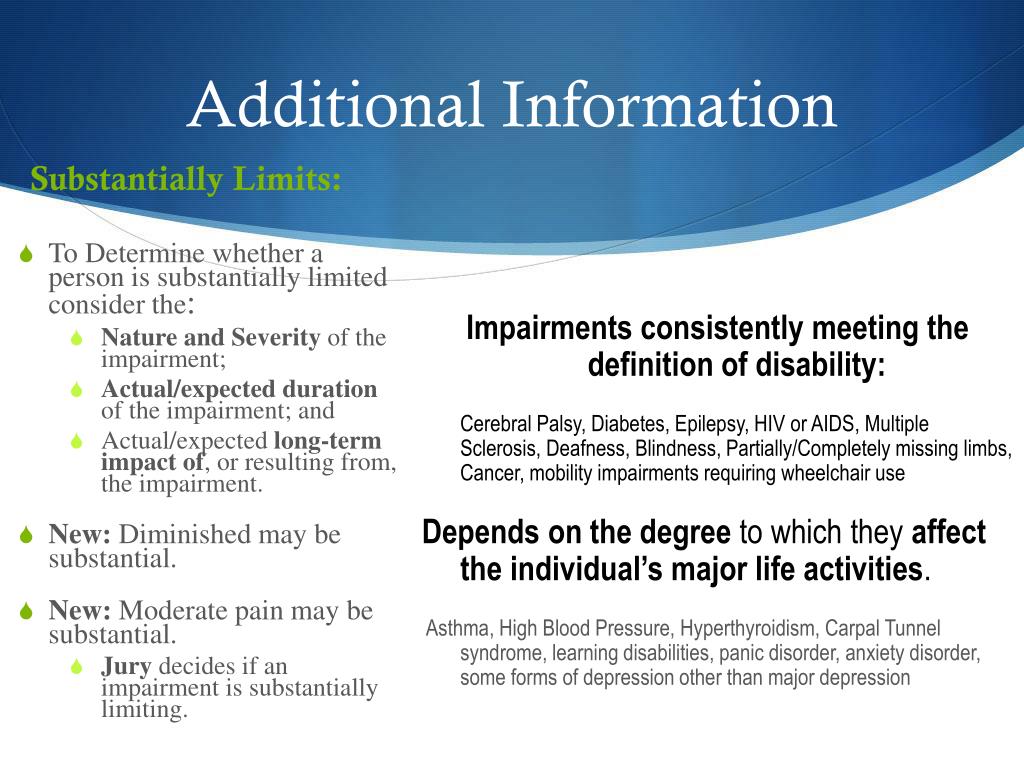

In order to claim disability status, you must be able to prove your anxiety disorder limits your life in a substantial way. They also can’t reduce or limit your pay, even if the disorder hinders your performance.

Not only does this make exclusion based on a disability illegal, but it also makes inclusion mandatory.įor example, if you find it difficult to work due to an anxiety disorder, your employer can’t bar you from a promotion for this reason alone. This means employers and businesses can’t discriminate against you due to your condition. Under the ADA, anxiety disorders receive the same protection as any other disability. For this reason, if your anxiety is severe enough to be considered a disorder, it likely qualifies as a disability. Sleeping, eating, working, communicating and concentrating all fall under this definition. To be considered a disability, your anxiety disorder must “substantially limit” your ability to complete major life activities.Ī “major life activity” can mean many things. So, is anxiety covered under the ADA? The answer is yes - on one condition. This expanded the definition of a disability to include various psychological disorders. government passed the Americans with Disabilities Act Amendment Act in 2008. Recognizing that mental conditions can be just as damaging as physical ones, the U.S. If you have an anxiety disorder, you know how debilitating it can be. You’ll also spend much of your time trying to avoid triggers. Even when there’s nothing to stress over, you’ll be unable to prevent worrying and having anxious thoughts. Those with an anxiety disorder can often find it nearly impossible to get out of bed.įinally, an anxiety disorder is constant. If you experience natural anxiety, you’ll still be able to maintain relationships, keep up with work and even enjoy hobbies. On the other hand, having severe anxiety in the face of a life-altering situation is a proportional response.Īdditionally, an anxiety disorder will prevent you from functioning normally. Experiencing extreme physiological distress over a minor task that most people would complete without a second thought may indicate you have an anxiety disorder. The first is that the anxiety is disproportionate to the situation. There are a few characteristics that set anxiety disorders apart from a natural anxiety response. However, even those who experience anxiety frequently may not have an anxiety disorder.

This percentage is similar across groups regardless of age and gender - anxiety can truly affect anyone. The National Institute of Mental Health estimates that over 31% of adults in the United States will experience an anxiety disorder in their lifetime.

Trouble arises when the stressor goes away but the anxiety doesn’t.Īnxiety disabilities can take several forms, including: When faced with stress or uncertainty, some anxiety is a completely natural response. But the truth is, most people get anxious occasionally. It’s easy to confuse being anxious with having an anxiety disorder. Whether it feels like drowning in a wave of fear or being trapped on a never-ending roller coaster, an anxiety disability can inflict serious damage on your life over time. No two people experience anxiety exactly the same way. Living in constant fear of an anxiety trigger can lead to high stress levels, which have repercussions of their own. You might also struggle to maintain intimate relationships or make decisions. With an anxiety disability, you may be unable to focus on responsibilities for work or school, even with a tight deadline. Those with anxiety often have trouble completing basic tasks due to perceived threats - no matter how irrational these threats may seem. Will Insurance Cover Behavioral Treatment?Īnxiety can also trigger panic attacks periods of intense fear that cause severe physical effects.Beacon Health / Value Options Insurance.Rehab Success Rate – Does It Really Work?.Shatterproof FHE Health (First Responders).


 0 kommentar(er)
0 kommentar(er)
